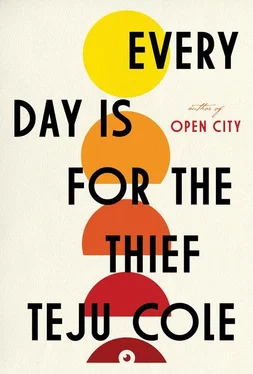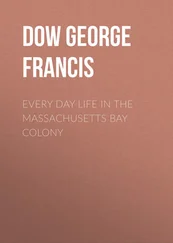At no time is Amina awkward in handling objects. It is she who gives me the glass of water, in the clawlike grip of her right hand. When she writes (but this I know only from hearsay) she writes with her left. She had to learn again, with a hand different from the one that used to write to me. On the television, the camera zooms in on a man with wide eyes, then cuts away and zooms in on another man, with whom he’s locked in staring combat. The little girl finally wakes up. Hello, Rekia, I say. She shies away.
Amina says:
— So moving back has crossed your mind?
— It has crossed my mind.
This is the answer I have heard others give. It will be many weeks before it rains again. When I leave their house, I wipe water from the side-view mirror to get a better glimpse of the three of them waving me bye. They are close together and small, as in a medallion of the Holy Family.
I escape family and go out into the city on my own to observe its many moods: the lethargy of the early mornings, the raucous early evenings, the silent, lightless nights cut through with the sounds of generators. It is in this aimless wandering that I find myself truly in the city. The days go by. I do not delve, as I had thought I would, into my childhood, do not visit my former schools or look up other old friends.
One afternoon, a few days before Christmas Day, as I walk on Allen Avenue with no particular destination in mind, I happen on a sign for a jazz shop. I follow the arrows and enter a small room at the back of a building. Here at last is something that caters to the tastes of the minority. All that is available at the many street-side record shacks is Nigerian music and records by popular black American and Caribbean artists: hip-hop, dancehall, reggaeton. The interior, covered in glass cases and mirrors, is like a miniature version of the set for the final fight scene in Bruce Lee’s Enter the Dragon . The glass cases have a decent selection of music. There are the “smooth jazz” artists with their cloying offerings, but there are also many discs by the giants: Miles Davis, Thelonious Monk, Sonny Rollins, and many others. The modern jazz adventurers such as Vijay Iyer and Brad Mehldau are also well represented. The ceiling of the shop is, like all the walls, a mirror. The reflective surfaces, in combination with the bright fluorescent lighting, have the peculiar effect of making the room feel not bigger but, rather, smaller and weirder, as if one were stuffed into one of those camera obscura boxes so favored by the early Dutch lens grinders.
A woman and a man are talking at the cashier’s table when I come in. The woman is also working on an accounts book. I look around the shop, and when I have taken note of what is available, I ask about prices.
— Oh, sorry, none of it is for sale.
— Excuse me?
— The compact discs are not for sale. Unless you want to pay three thousand five for each one.
I am confused. A jazz shop, but the discs are not for sale. Unless I pay twenty-five dollars for each, an absurd figure. Most of these discs wouldn’t cost me any more than fifteen dollars in the States, and some of the reissues would be considerably less. What could be her meaning?
— But, sir, if you see something that you like, what we can do is make a copy for you. That applies to any disc in the shop. And that costs one thousand naira. But the originals are not for sale.
A legitimate business, with a public sign, on one of the busier commercial streets in town, catering to a sophisticated clientele, and all the while living on piracy. Do they have any idea that this is a problem? Or is it enough to settle for sophistication without troubling oneself about the laws that defend creativity? The following week, I visit a shop called Jazzhole on Awolowo Road in Ikoyi. And there I finally find myself in an inspired and congenial setting. The place is a combination music and book shop. The owner is one of a small but tenacious breed of Nigerian cultural innovators. The presentation is outstanding, as well done as many a Western bookshop: there is a broad selection of jazz, Pan-African, and other international music near the capacious entrance, and rows and rows of books for the general reader toward the back. The shop has a cool and quiet interior. Here, I think to myself, is finally that moving spot of sun I have sought.
I see music by Ali Farka Touré, by Salif Keïta. There are books by Philip Roth, Penelope Fitzgerald, and, as I had hoped, Michael Ondaatje. The prices are high; not higher than they would be in an American or British shop, but certainly beyond the reach of most Nigerians. And yet, knowing that there is such a place, in the absence of good libraries or other vendors, makes all the difference to those who must have such sustenance. And better at these high prices than not at all. But the illegitimate business model of the other jazz shop is a threat to this essential work. The people behind the bookshop have also created a record label — they have released three albums by the wonderfully named highlife artist Fatai Rolling Dollar — as well as a publishing house. One of their newest projects, the book Lagos: A City at Work , is a huge textual and photographic compendium of the life of labor here. It features the work of Nigerian thinkers, writers, and photographers, all grappling with the “nonlinear nature” of the city. It is a brilliant confrontation with our great behemoth of a settlement. And there is really only one word for what I feel about these new contributions to the Lagosian scene: gratitude. They are emerging, these creatives, in spite of everything; and they are essential because they are the signs of hope in a place that, like all other places on the limited earth, needs hope.

I am in the van with Aunty Folake and Uncle Bello. They have many errands to run and I’ve come along for the ride. Every moment I can spend with them is a pleasure. My aunt is a devout Christian who gets up at five every morning to spend an hour with the Bible and devotional texts before the sun rises. Her brother is a committed Muslim. The group he belongs to is called NASFAT, the Nasrul-Lahi-il-Fathi Society of Nigeria, the major Islamic renewal organization in Lagos. With his placid temperament, he is the very antithesis of a jihadi, which makes it funnier that his sister and brother-in-law sometimes tease him with the name Mr. Osama. But, as far as I can tell, they never actually discuss religion, much less attempt to convert each other.
We have several stops to make this morning: we have to buy some live chickens, we need to refill some large jerry cans with palm oil, and there are repaired suitcases to pick up from the leather worker. So we drive all around the neighborhood and I get to see how thickly populated even these outlying areas of the city have become in my absence. Out here, at the spreading edge of the gigantic metropolis, there is a feel of busy village life. It is an urban density, but in the rhythms of certain interactions, away from the highways and major bus stops, life is languid, and the general feeling less frenetic.
The woman selling the oil expertly measures out the exact amount required. The fluent substance is beautiful to watch. It falls in an orange-colored cord from one vessel to the other, gleaming in lines like twisted silk. Across the street from where we buy palm oil, there is a long line of children and women fetching water at a tap. They carry brightly colored plastic bowls. They are orderly. The solitary faucet comes out of a pipe attached to the fence of a large private house. But how does this work? My aunt says:
Читать дальше













